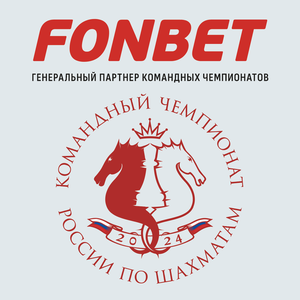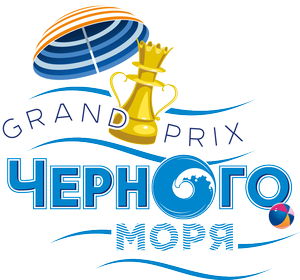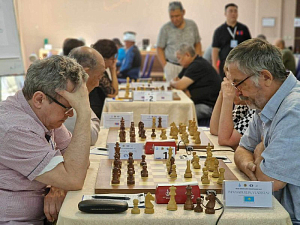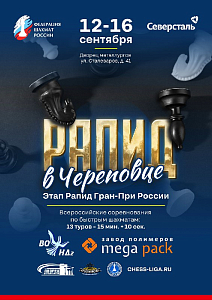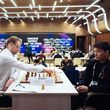Selfcheck and Other Adventures of Magnus
Dmitry Kryakvin explores the rich history of World Blitz Championships
Blitz gained widespread popularity much earlier than rapid chess. Even Botvinnik, known for his hostile attitude towards speed chess in general, was spotted blitzing on a train to the USSR Championship. And do you remember the amazing finale of a blitz game between the earlier champions, Capablanca and Alekhine? Or one of the Moscow Blitz Championships, which went on without the World Champion Petrosian, for his wife Rona Yakovlevna could not stand a chance of Tigran losing to the chess hooligan Genrikh Chepukaitis? Mikhail Tal, who traveled all across the Soviet Union with exhibition games, was happy to play anybody with one minute against five. And do you like that story about Korchnoi running to a game in the Central Chess Club? When he arrived, he only had two minutes left. Mad as a hornet, he blamed arbiters all the way, but still managed to checkmate his opponent with a few seconds on the clock.
I hope the upcoming fantastic tournament in St, Petersburg will also provide us with equally epic stories about the world's most powerful ones, and entertain us with amazing plots and brilliant decisions. However, let us focus on the past events first.
Blitz appeared roughly at the same time as regular, “lengthy” chess. Even when there was no clock, players of the Paul Morphy era enjoyed quick “one-two-three” games. However, the first official World Blitz Championship took place in the same year as the first Rapid Championship, much, much later than the first classical World Championship.
Talking unofficial, we should highlight the 1970 Herceg Novi, which was a double round round-robin with 12 players who had participated in the recently finished Match of the Century. Robert Fischer won magnificently with 19 out of 22, with only a single loss. According to those present, the American genius has never spent more than three minutes out of the allotted five. Tal finished with 14.5, Korchnoi had 14, and they were followed by Petrosian, Bronstein, Hort, Matulovic, Smyslov, and Reshevsky. Yet, Spassky, Stein, Larsen, Geller, Keres, and some other top players did not participate, so Dimitrie Belica, the famous chess journalist, pointed out: “A fantastic win for Fischer, however, this was not a world championship!”
1. St.John's, Canada, 1988. double scotch and pack of cigarettes
The first World Blitz Championship took place in St. John's, Canada and followed candidates matches. The organizers failed to gather all the strongest players or even all the candidates. Very few Soviet players made it to St. John's due to its remoteness from Europe, however, the lineup was nevertheless quite respectable: Tal, Vaganian, Speelman, Yusupov, Seirawan, Georgiev, Salov, Ehlvest, Spraggett, Chernin, Dlugy, and so on. The Championship gained legitimacy due to the participation of the arch-rivals Karparov and Karpov, who were expected to meet in the final. However, the expectations did not materialize.
The tournament was a knock out for 32 players with best-of-four matches. The sensations began to pile on right from the start, when Chernin knocked out Karpov. Kasparov was eliminated in the Quarterfinal on what probably was the worst day of his life barring the match against Kramnik. First Garry stalemated Georgiev's bare king with a queen and a bishop, then failed to give a forced mate, and finally blundered a mate-in-two himself!
Georgiev-Kasparov
Game 2
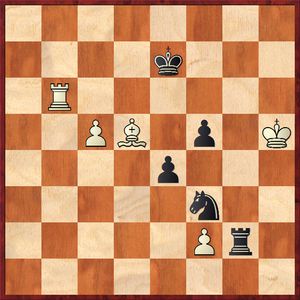
59.c6?? Rxf2??
Black would checkmate after59...Kf6! 60.c7+ Kg7 61.Rg6+ Rxg6 62.c8Q Rg5#.
60.c7 Rh2+ 61.Kg6 Rg2+ 62.Kxf5 Rg5+
The king could stop the pawn easily after 62...Kd7 63.Bxe4 Rf2, however, with a few second remaining on the clock, the games continued as follows:
63.Kxe4 Kd7 64.Rc6 Nd2+??
Black could still resist after 64...Re5+ 65.Kxf3 Re8, killing the с7-pawn.
65.Kf4 Black resigns.
Georgiev-Kasparov
Game 4
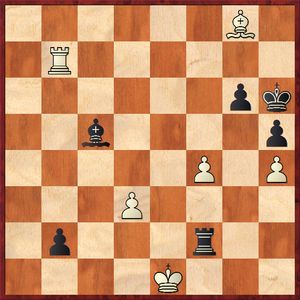
After51...b1Q+ 52.Rxb1 Rxf4 Black wins theh4-pawn, but I don't think Garry Kimovich would manage to win the resulting position – the h1-square is light, and the champion was extremely short on time.
Yet, instead of playing the line above, Black collapsed: 51... g5?? 52. hxg5+ Kg6 53. Bh7# Mate!
By the way, Kasparov took the St. John's results close to his heart and won every single future game (!) against Kiril Georgiev.
The Semifinal match between Georgiev and Vaganian was quite a dramatic one. At some point Rafael Artyomovich was accused of pressing the clock after making an illegal move. A video recording resolved the issue: he only touched the button, but did not press it. The match ended in Vaganian's favor – 4.5 to 3.5.
Mikhail Tal defeated the Karpov's nemesis Chernin in another Semifinal. In an interview after the event the Wizard from Riga said that he wasn't taking it seriously, was chain-smoking the whole time, and his preparation to the Semifinal consisted of a double scotch!
The scotch gave the 8th World Champion the much-needed acceleration – he crushed Vaganian 3.5 to 0.5 in the Final and became the first World Blitz Champion in the history of chess!
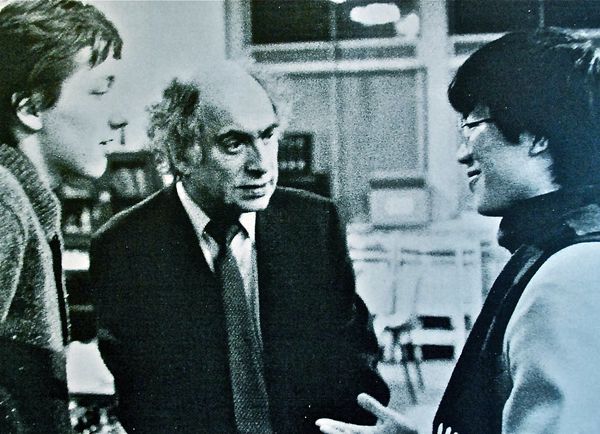
Trivia
Kasparov-Georgiev match was filmed and is available on YouTube. The footage includes shots of other participants and numerous fragments of Mikhail Tal's victories.
The commentators of Chernin-Tal match emphasized that the younger player is better fit and it may tell when both are dramatically short on time. However, in the ultimate game Mikhail Nekhemievich was moving pieces like a young man and confidently flagged the opponent being down a piece.
After the tournament, grandmaster Walter Browne founded the Association of Chess Blitz and began publishing a magazine dedicated to blitz, which existed until 2003.
The prize fund was $75,000. Tal received $37,500 and... handed them over at the USSR Sports Committee, to get Beryozka checks and Soviet roubles at the official exchange rate in return. “They asked nicely...”, said Tal in his excuse after being reprimanded by his former second Genna Sosonko.
The Canadians were keen to organize the second championship with improved conditions in 1989, however, the Soviet Chess Federation vetoed it. After all, Kasparov and Karpov were eliminated, and there was a real possibility for a foreigner to win it, thus taking the crown away from the Soviets. Tough negotiations ensued, and the Canada-1989 project was canceled.
The gap between the first and second World Blitz Championships was even longer than the gap between the World Rapid Championships. However, elite blitz tournaments kept appearing, even if they did not hold any official status. The World Blitz Cup in Warsaw, organized by PlusGSM,deserves special mention. 367 players played the 11-double-round Swiss with 5+0 control. The strongest players received special prizes – Nokia mobile phones, a rare commodity at the turn of the millennium. Vishy Anand took the first place with 17.5/22. Half a point behind were 2.Gelfand, 3.Karpov, 4.Akopian, 5.Ivanchuk, 6.Adams, 7.Epishin,and ten more well-known grandmasters finished a point behind the winner.
2. Rishon LeZion, Israel, 2006. The anniversary and explosions
The Israeli city of Rishon LeZion had its 120-year anniversary in 2006, and decided to celebrate it by reviving the World Blitz Championship. City authorities kicked some money in, Israeli Chess Federation added some more, and in the end the prize fund reached $92,500, $16,000 to the eventual winner.
176 players (35 grandmasters) took part in a qualification tournament. Six qualifiers advanced to the final 16, which also included world's top players and a couple of organizers' picks. The very young Magnus Carlsen was among the latter, however, he failed to impress and finished in the middle of the pack. Finally, two more players qualified online on the ICC. Alas, World Champions Kramnik and Topalov missed the event as they were about to inspect the capital of the Kalmyk Republic. Aronian, Morozevich, Ivanchuk, and Leko also missed the championship for various reasons.
September was reasonably hot. The event was carried out in the city theater. Judit Polgar and Boris Gelfand took the early lead. In their individual game Boris managed to checkmate the lady with a bishop and knight with only a handful of second left, taking a proper care of the 50-move rule. However, the early heroes were later surpassed by Grischuk, Svidler, Radjabov, and Anand. The Russians collected 10.5 out of 15, their pursuers were half a point behind. Radjabov took the bronze.
The outcome of the championship was decided in a sudden death game. After the drawing of lots, Grischuk received the white pieces.
Grischuk-Svidler
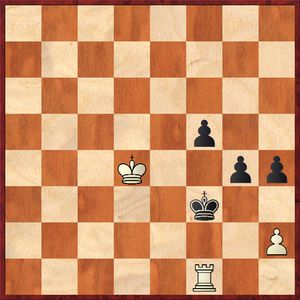
59...Ke2?
Playing on seconds, Peter Svidler misses the championship title! Black could force a draw by 59...Kg2 60.Rxf5 Kxh2 61.Ke3 g3 62.Rg5 g2 63.Kf2 h3 64.Rg3 g1Q+! 65.Rxg1, stalemate.
60.Rxf5 g3 61.h3 g2 62.Rg5 Kf2 63.Ke4, and White proceeded to win the pawn ending, as the Black's king is not in time to come back.
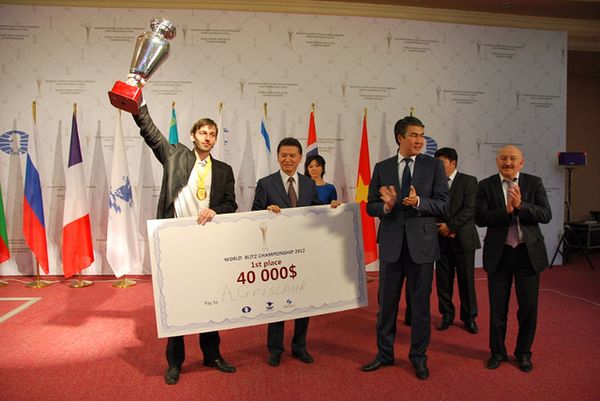
Trivia
The spectators in the playing hall were reacting very emotionally, on numerous occasions forcing the arbiters to restore order.
Shimon Peres, Prime Minister of Israel, appeared at the final round and made a ceremonial first move. However, instead of coming to the first board, he chose the game of the young Magnus Carlsen!
During the closing ceremony, Alexander Grischuk thanked his trainer Anatoly Bykhovsky for the lifelong help.
A match between the nation team of Israel and Junior 10 chess program was arranged during the championship. The AI won 3-1.
In the summer prior to the championship, there was an armed conflict between Israeli Army and Hezbollah. The northern part of the Holy Land was briefly under fire, but the Israel Defense Forces suppressed the firing points and advanced to the territory of Lebanon. The UN Security Council called to cease fire on August 14. Due to these events, only four foreign players – Bareev, Dlugy, Vaisser, and Milov – attended the qualification tournament, others decided against taking the risk.
3. Moscow, Russia, 2007. We can see the Red Square in a window!
The capital of Russia hosted the next World Blitz Championship, which followed the Tal Memorial. Rustam Kasimzhanov won a qualifier in the Central House of Chess Player and with seven other top finishers advanced to the final – a double round round-robin for 20 players, which took place in the GUM on the Red Square. The blitz marathon drew enormous interest among Moscow chess fans, and the players often had hard time getting to their tables. Gata Kamsky, for instance, had a dedicated support group – niece, cousin, and her husband, and they were always standing next to Kamsky's board.
A new time control 4 minutes + 2 seconds per move was introduced (later the number of initial minutes was changed to three). Vishy Anand and Vassily Ivanchuk were in close contention of the title. Ivanchuk, who had had a very poor classical tournament, played with incredible energy. It is sufficient to recall his 215-move game against Peter Leko – this is one of the longest games of the World Blitz Championships, however, nobody knows whether it broke any records, as the scoresheets of blitz games are often incomplete.
Ivanchuk-Leko
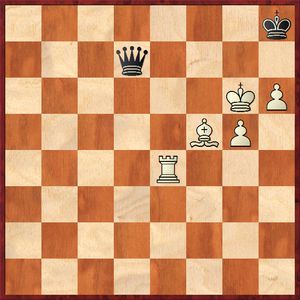
Black shook the board with 215…Qf7+!
“I realized that a stalemate is the only way to stop Ivanchuk!” (Leko).
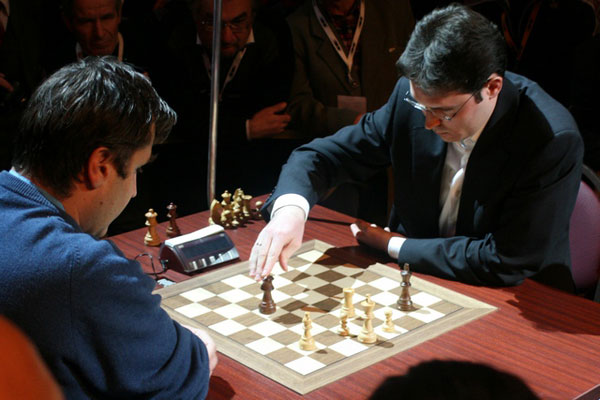
Ivanchuk and Anand were dead even before the final round – and they were to play each other!
Anand-Ivanchuk
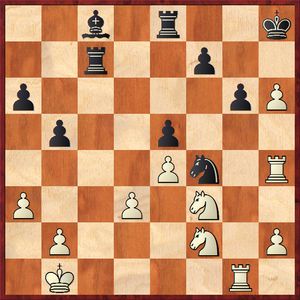
33.Nxe5? Ne2 34.Re1 Nd4!, and White is unable to avoid the fork – 35.Neg4 Nf3, and Black wins.
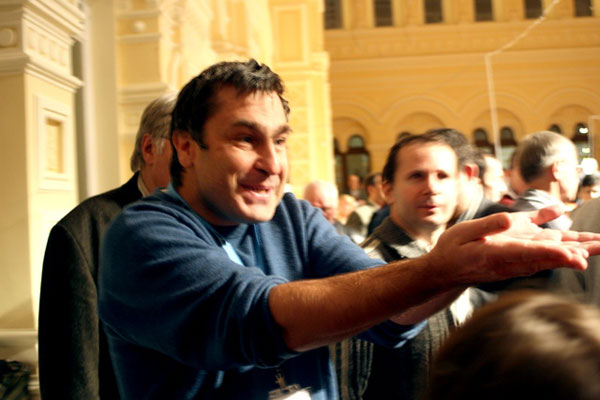
Grischuk finished third.
Trivia
Kramnik and Anand were playing at the tables #1 and #2 respectively.
Flash photography was allowed only before the start of the clocks. In addition to that, Kramnik asked the arbiters to protect him from non-flash photography as well, because the clicks of camera shutters distracted him.
The Eurocement was the head sponsor of the tournament. After the championship, Vladimir Kramnik left his handprint on a chess board made of the sponsor's cement.
After the tournament, Ruslan Ponomariov called for separate ratings for blitz and rapid.
4. Almaty, Kazakhstan, 2008. No place to qualify from
The prize fund of the 2008 World Blitz Championship in Almaty was 280,000 Swiss Franks, with 80,000 for the first place finisher. The Alliance Bank was the main sponsor. The event was a modest single round round-robin for 16 players. The spots were given to five top players from the 2006 and 2007 championships, continental champions, and organizers' nominees. There was no qualification tournament of any sort.
Anand did not participate, Grischuk was in poor form, so the title was truly contested only by Ivanchuk and Lenier Dominguez. The Cuban collected 11.5 out of 15, the Ukrainian fell half a point short. Peter Svidler finished third.
Dominguez-Grischuk
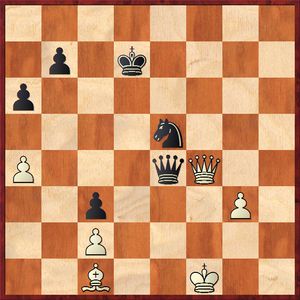
This proved to be a key game of the championship. After it the Cuban became unstoppable, and Alexander dropped out of the race. In the diagrammed position Dominguiez had just a couple of second on the clock. Grischuk had a little bit more time, but did not capture the c2-pawn, which would secure him a win.
40... Qh1+? 41.Ke2 Nc6 42.Qf5+ Kc7
42...Ke8.
43.Bf4+ Kb6?
The king is running towards the trap. Black needed to show some modesty by 43...Kd8.
44.a5+! Nxa5
There is no 44...Ka7 due to45.Qc5+ Ka8 46.Qf8+ Ka7 47.Be3+ with a checkmate.
45.Be3+ Kc6 46.Qc5+ Kd7 47.Qxa5 Qg2+ 48.Kd3 Qf1+ 49.Ke4 Qg2+ 50.Kf4 Qxc2 51.Qd5+ Ke7 52.Qe5+ Kd7 53.Qd5+, and Black lost on time.
This was the first time for the title to go to a very strong, but not a truly elite player.
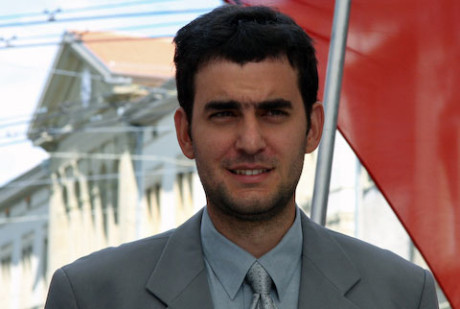
5. Moscow, Russia, 2009. The Viking triumphs
Once again the World Blitz Championship returned to the Russian capital. FIDE suggested to copy the format of the previous year, but the chief editor of the 64-Chess Review Mark Glukhovsky convinced the RCF Executive Alexander Bakh to carry out a proper qualification tournament – a large blitz event following the Aeroflot Open. The six spots went to Karjakin, Gashimov, Mamedyarov, Bareev, Tkachiev, and Najditsch. Karpov, Dominguez, Grischuk, Jakovenko, Judit Polgar, and Kosteniuk received wild cards. The rest of the spots – ten – went to the Tal Memorial participants. This was another marathon championship – 22 player double-round round-robin, 42 rounds total!
The lineup was incredible: Carlsen, Kramnik, Anand, Gelfand, Svidler, Morozevich... Only Topalov, Nakamura, and Radjabov were missing among the top rated players. Karjakin and Mamedyarov had to qualify – how do you like that! Once again the championship took place in the GUM, with a nice Red Square view from the playing hall.
It ended with a brilliant victory of Magnus Carlsen, which reminded of the Fischer's legendary achievement. The Norwegian scored 31/42, three points ahead of Anand, six points ahead of Karjakin. Noteworthy:Carlsen defeated both of these players as well as Kramnik (4th), and Grischuk (5th) with the perfect 2-0 score.
Anand-Carlsen
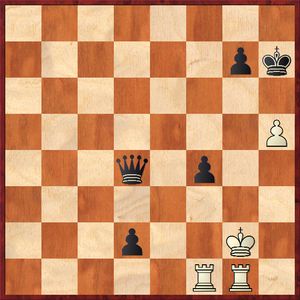
Black wins in many ways, but the epaulette mate is surely spectacular: 45...Qe3 46.Rh1? Qg3#.
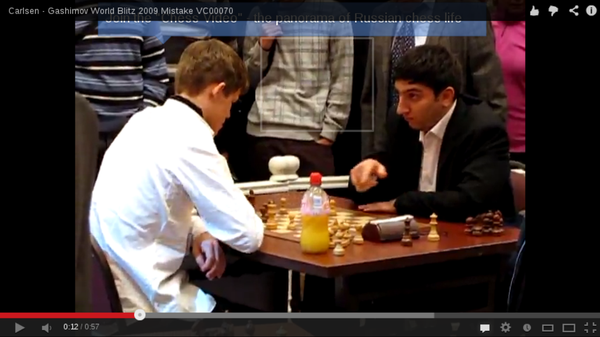
Trivia
In 2009 Carlsen obtained a powerful sponsor – Arctic Securities bank. His triumph in Moscow convinced the Norwegian bankers that Magnus will surely become a World Champion in classical chess.
There were two online streams: Sergey Shipov worked on his own Crestbook.com website, while Genna Sosonko and Mark Glukhovsky entertained the visitors of the official site.
The women had quite a decent tournament: Judit scored 17/42, and Kosteniuk drew her matches with Carlsen, Anand, Grischuk, Morozevich, Gashimov, and Aronian!
The time control was shortened from 4+2 to 3+2.
6. Moscow, Russia, 2010. Tal's method is not forgotten
The 2010 championship was finally labeled as the 6thWorld Blitz Championship – FIDE recognized the 1988 St. John as the number one. The setting was similar to the previous one – Moscow, post-Aeroflot Open qualification, the GUM, the Red Square. However, the solo effort of the mighty Norwegian was disputed by two other players – Teimour Radjabov, who missed the previous championship, and Levon Aronian, who played just brilliantly. Aronian lost his two final games, but nevertheless surpassed Teimour by half a point and won the first prize – 25,000 Euros.
Aronian-Caruana

Black can draw by both 57...Rf1+and the typical57...g6+. However, the young Fabiano played
57... Rxh5?? and found himself without a good move after 58.Ra8.
58…g6+ 59.Kf6 Rh1 60.Ra7+ Kg8 61.Kxg6 Kf8 62.Ra8+ Ke7 63.Kg7 Black resigns.
“Oh my Lord” – the famous trainer Mark Dvoretsky, who had a training camp with Caruana shortly before the championship, whispered these words with a completely shocked expression on his face.
For the defending champion, the event was full of ups and downs. Once again he tried to take back a move after blundering a rook against Savchenko – caught by an arbiter, had to resign. However, enviable determination allowed the Norwegian to finish respectable third. There were 20 participants that year, and almost all of them were first rate stars.

Trivia
An engineering company with a chess name E4 was the main sponsor of the championship.
“Carlsen has returned!” – was the catch phrase on the posters at the streets of Moscow.
This time Magnus played the entire tournament on the board 1.
Alexei Shirov, who by that point had played seven tournaments in a row without much rest, decided to take a break and passed on the championship. “This is probably the main difference between Tal and me – he would never shy away from playing blitz!”, commented Shirov.
Rauf Mamedov began the tournament with 10 straight losses, but then employed Tal's strategy from St. John's (only replacing scotch with the famous Russian drink), and finished in the middle of the pack!
Before the championship Nakamura promised to beat Grischuk like a kid. Grischuk won their match 1.5-0.5.
In 2011, the new RCF leadership decided to dedicate the annual Moscow super tournament to Botvinnik, with no replacement to the Tal Memorial blitz offered. Next year, in 2012, the World Blitz and World Rapid Championships were merged together, and are carried out this way ever since.
7. Astana, Kazakhstan, 2012. You are not qualified for this job!
There was a controversy around the World Blitz Championship in Kazakhstan – the organizers revoked the right to play from those who qualified for the cancelled 2011 championship – Ponomariov, Andreikin, Tomashevsky, So, Mamedyarov, and Vitiugov. Ruslan Ponomariov published an open letter, trying to draw attention to this problem, but did not succeed.
Four players qualified from local tournament in Astana and joined 12 invited players in the championship, which was a double round round-robin. Alexander Grischuk won it with 20 points out of 30, followed by Magnus Carlsen with 19.5, and Sergey Karjakin with 18.5. The prize fund was $200,000, the winner received $40,000 – the same numbers as in rapid chess.
Grischuk-Gelfand
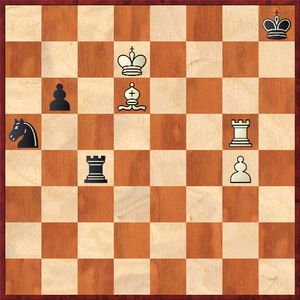
70.Ke6?
White wins after 70.Be5+ Kh7 71.Ke6 Nc6 72.Rg7+ Kh6 73.g5+ Kh5 74.Kf5.
70...Kh7?
Boris Abramovich misses his lucky chance:70...Nc6! 71.Kf7 Nd8+.
71.Kf7 Black resigns.
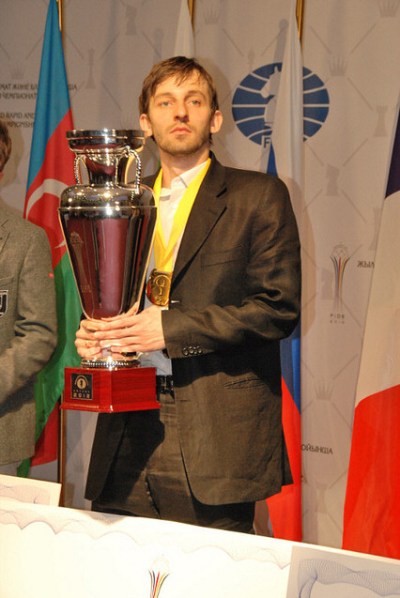
Alexander Grischuk's second trophy
Trivia
After a poor start Magnus Carlsen won eight games in a row, including the one against Radjabov, which he started with 1.а2-а4.
8. Khanty-Mansiysk, Russia, 2013. The Master from the East
This event took place in summer, and for the first time the organizers chose the Swiss format, scraping the qualification as well. 60 players took part in the event, which consisted of 15 doubled rounds. Tie-break games in the case of a tie were replaced by tie-break scores.
Anand and Carlsen were absent, getting ready to battle for the classical title, some other elite players were missing, too. In their absence the blitz title went to the two-time Aeroflot Open champion Le Quang Liem, who scored 20.5 points in 30 games. For quite a while he was closely and sensationally followed by his compatriot Nguyen, however, the second Vietnamese was surpassed on the final day by Grischuk and Ponomariov – 20 points both. Nepomniachtchi also scored 20 points, but his tie-break score was inferior. Nguyen, the second hero from the East, finished fifth.
Le Quang Liem-Mamedyarov
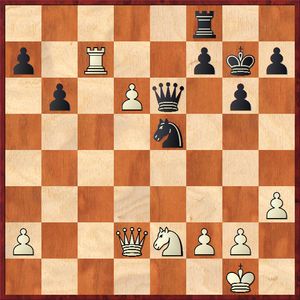
26.Qd4! Qf6
Black's life is bitter after 26...Kg8 27.Nc3 as well.
27.f4, and White wins a piece.
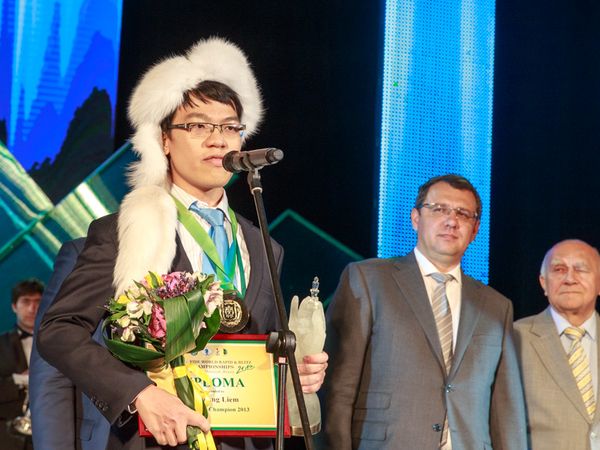
Trivia
At the closing ceremony Ruslan Ponomariov stated that he is happy to finish third: the prize money is good enough, and winning the tournament means too much painful attention from journalists at home!
9. Dubai, UAE, 2014. The storm
In 2014 Magnus Carlsen collected all the chess belts, adding rapid and blitz titles to his classical title. Curiously, his main competitors in the World Blitz Championship were the third tier favorites – Lu Shanglei and Georg Meier at first, and then Sergey Yudin, the much-feared king of Russian Swiss events. Afterwards Sergey said he could not believe to find himself in front of Carlsen in the penultimate round, and lost without a fight.
Carlsen picked up every single point against the overachieving underdogs and won the title with 17/21 (this time it was a Swiss with 21 single games). Nepomniachtchi and Nakamura finished with 16 points each.
Yudin-Carlsen
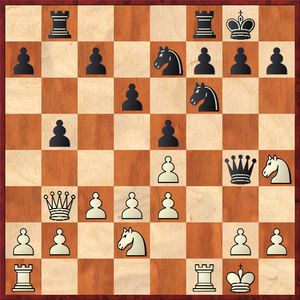
15.Nf5?
The solid 15.Nhf3 should be preferred.
15...Nxf5 16.Rxf5 Qe2! 17.Qc2 Ng4 White resigns
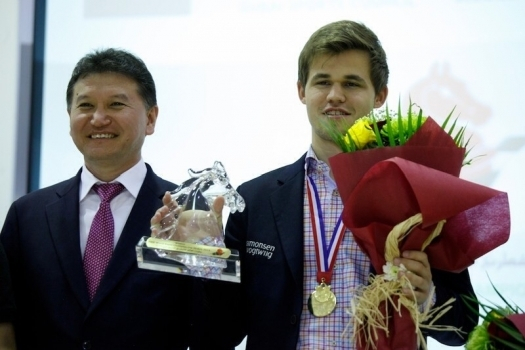
Trivia
Carlsen had only fourth highest rating in blitz prior to the championship, surpassed by Nakamura, Karjakin, and Aronian.
A peculiar finale took place in Carlsen-Le Quang Liem: the defending champion defended for 50 moves without captures and pawn moves, and then suddenly broke under the pressure and resigned.
10. Berlin, Germany, 2015. The third title!
The championship in Berlin was particularly large in numbers, attended by multitudes of European and especially Russian players. It provided a sensation: the defending champion started with 8/9 and then suddenly collapsed, losing to Karjakin, Radjabov, and Grischuk. Thanks to his great fighting spirit, Carlsen managed to come back, but in the 20th round he lost to his nemesis Ivanchuk and was out of the top-3.
The struggle for the first place was very tense, and in the end Grischuk (15.5/21) prevailed over MVL and Kramnik (15 points each).
Grischuk-Cheparinov
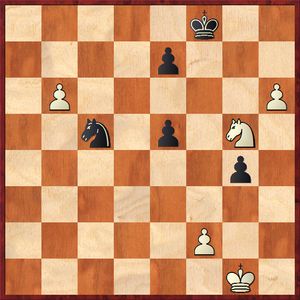
52.Ne6+!, and the white pawn queens.
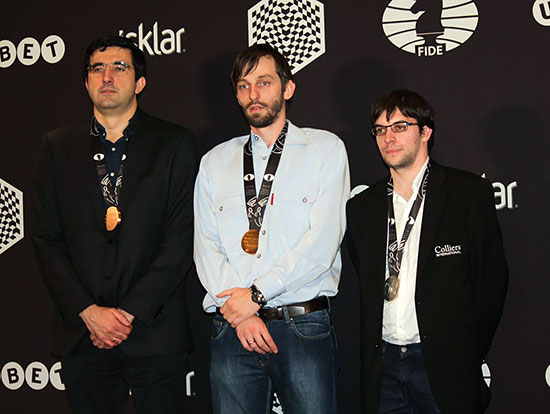
Trivia
The footage of the World Champion's emotional reaction to defeats became one of the most popular chess videos ever.
11. Doha, Qatar, 2016. The challenger strikes back
The World Blitz Championship in Qatar took place shortly after the dramatic match in New York, where Carlsen defeated Karjakin on tie-break.
The rivals were leading after the first day with 10/12. Karjakin managed to beat Carlsen in their individual encounter, but was trailing half a point with a round to go. In the final round Karjakin defeated Baadur Jobava, while Carlsen failed to break through Peter Leko's defenses, and Karjakin won the title due to a superior tie-break. Both Sergey and Magnus scored 16.5 points, Daniil Dubov finished third with 14.5.
Carlsen-Karjakin
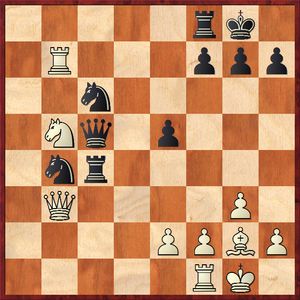
20.e3?? Na5! Out of sheer desperation, Carlsen captured on c4 with the queen and kept hopeless resistance until the move 97.
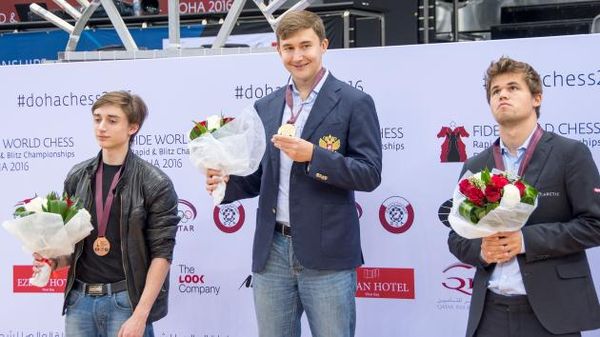
Trivia
It was the first time in the history of Russian TV that chess news – i. e., Sergey Karjakin's victory – preceded football and hockey.
12. Riyadh, Saudi Arabia, 2017. No orchids for the Appeals Committee
In 2017, Magnus Carlsen retook the blitz title and caught up with Grischuk with three blitz champion's belts each. His main rivals that year were Karjakin and Anand, which sounds incredibly accurate historically. The Norwegian scored 16/21, a point and a half above the runner-ups. The enigmatic Saudi Arabia, reactions of the ACP and other events of that year are described in detail in my text on the World Rapid Championships. However, the blitz event had a couple of controversies on its own.
In one of the early rounds Magnus Carlsen gave a check to Ernesto Inarkiev. The Russian did not defend, but gave his opponent a check in return! When Carlsen moved his king away from the latest check, Inarkiev demanded a win due to his opponent making an illegal move. A linesman satisfied his demand, however, the Chief Arbiter quickly overruled this decision, suggesting the players to resume the game. Inarkiev, whose position was much worse, declined and appealed, but the Appeals Committee backed the Chief Arbiter.
The heated discussion continued well past the championship. “Moskovskij Komsomolets” published a long interview with Inarkiev, various arbiters and organizes were keen to provide their view, etc.
There was also a less known but nevertheless important case of Grischuk-Mamedyarov. The Deputy Chief Arbiter received Grischuk's claim of a threefold repetition, but failed to verify it correctly, and ruled to continue the game. Eventually Grischuk lost, but appealed to the Chief Arbiter, and poor Mr. Nikolopoulos had to overrules another decision of his subordinate. Mamedyarov protested (according to Malcolm Paine, after the game was resumed, Grischuk was freerolling with a draw already secured!), but the Appeals Committee voted against his stance. And this game was played in the 19th round and had a huge influence on the tournament outcome!
Who said that chess is the fairest game in the world where arbiters cannot influence the result?
Carlsen-Inarkiev
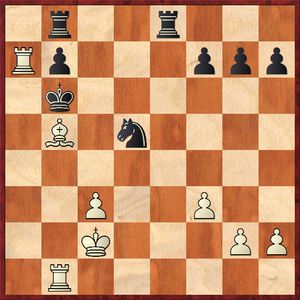
White's nice blow 27.Rхb7! was responded by 27…Ne3+?!?
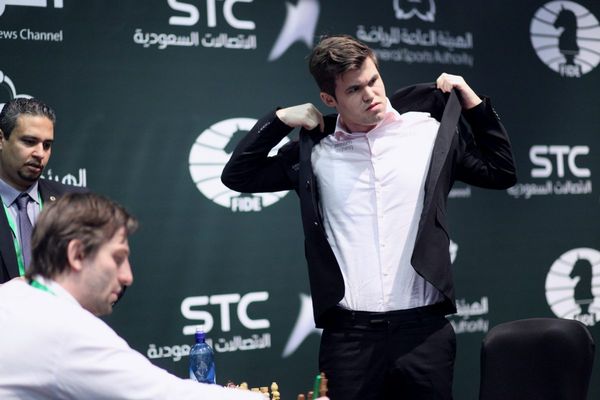
World Blitz Champions:
1988 – Tal
2006 – Grischuk
2007 – Ivanchuk
2008 – Dominguez
2009 – Carlsen
2010 – Aronian
2012 – Grischuk
2013 – Le Quang Liem
2014 – Carlsen
2015 – Grischuk
2016 – Karjakin
2017 – Carlsen
We are eager to learn the name of the next champion! See you in St. Petersburg! Hope the number 13 brings us no harm, and the Appeals Committee will have nothing to do but see beautiful sights of the former Russian capital.
Photos by Vladimir Barsky, Maria Fominykh, Anastasia Karlovich, Maria Emelyanova, ChessBase.com








